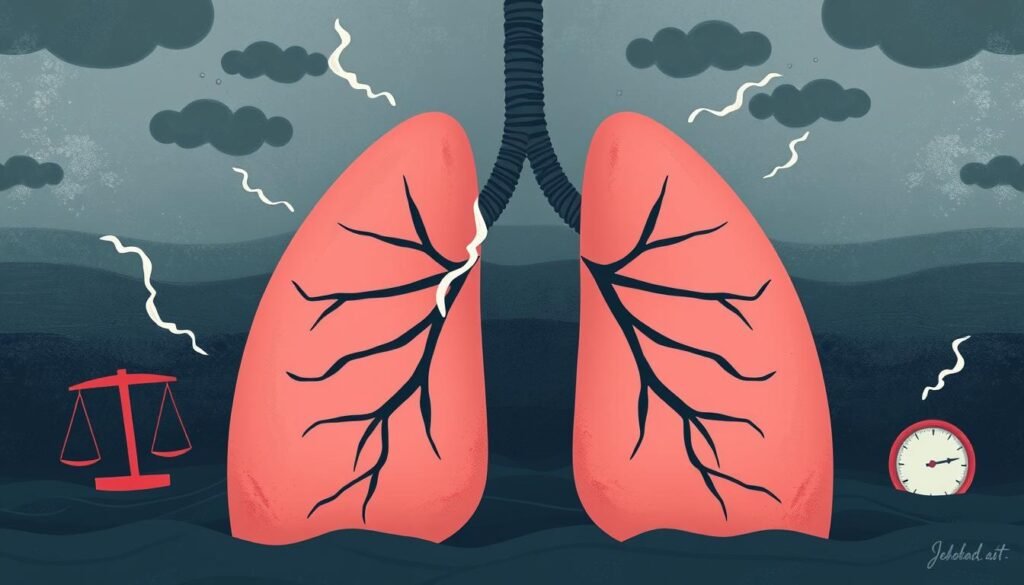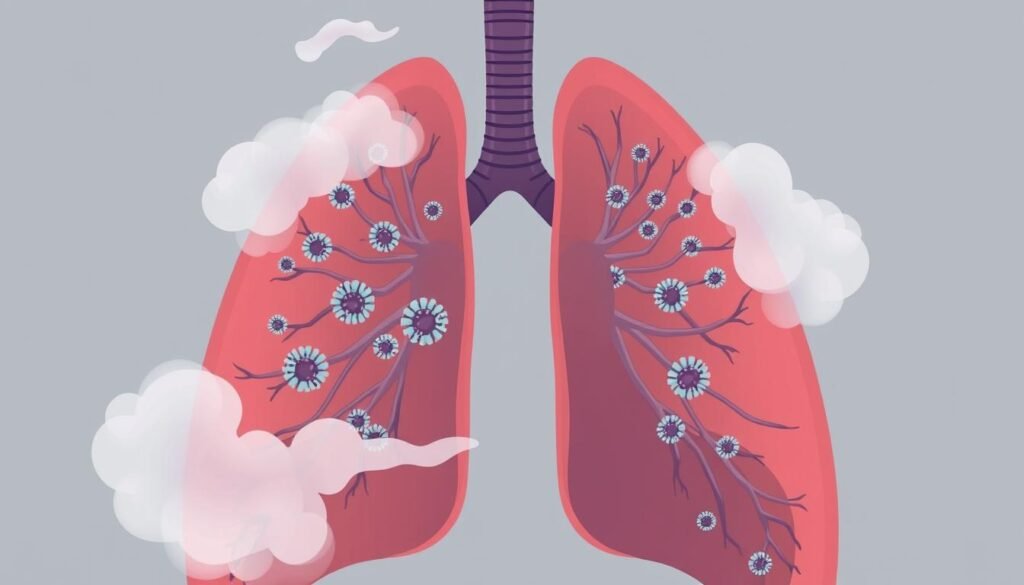About 80% to 90% of deaths from lung cancer come from smoking. This shows how vital it is to know the warning signs. Signs like a lasting cough, trouble breathing, and losing weight without reason can mean serious health problems. These can point to lung cancer, COPD, and other lung diseases.
Next, we’ll explain what causes these symptoms and the risks they bring. It’s crucial to spot signs like a persistent cough or breathing problems early. Health experts emphasize not ignoring these symptoms. If you notice them, get checked out right away. For more info on symptoms to watch out for, check this important resource.
Key Takeaways
- A persistent cough can signal serious underlying issues including lung cancer.
- Unexplained weight loss is a common but critical warning sign of health problems.
- Shortness of breath is more than just an inconvenience; it can indicate significant health conditions.
- Recognizing these symptoms early can lead to timely diagnosis and better health outcomes.
- Individuals experiencing these symptoms should consult a healthcare provider promptly.
Introduction to Warning Signs
Knowing health warning signs helps catch diseases early and treat them effectively. Being aware of what symptoms to look out for can greatly impact health results. Signs like a constant cough, feeling breathless, and losing weight without trying might mean there’s a bigger issue.
It’s important to pay attention to any new or strange changes in your body. For example, losing weight suddenly can be scary. This is because 2 out of 5 people with cancer saw this as an early symptom. If you notice sudden weight loss, you should see a doctor.
Watch out for extreme tiredness, fevers for no reason, and odd changes in how your body works. Finding a lump, especially in the throat, might point to thyroid cancer. Also, unusual bleeding could be a sign of a serious problem. It’s crucial to talk to a doctor if you notice these signs.
Teaching people about the signs of health issues helps them take charge of their health. Keeping an eye on symptoms leads to catching diseases early. This improves the chances of successful treatment and a better outcome for your health.
Understanding Persistent Cough
A persistent cough can be a big nuisance. It often means there are deeper health problems. Knowing the definition of cough and its types is crucial. It helps tell normal coughs from serious ones. Coughs are either acute, lasting less than three weeks, or chronic, lasting more than eight weeks.
Definition and Types of Cough
Coughing is a way to keep the airways clear. The types of cough include:
- Dry cough – a cough that doesn’t bring up mucus.
- Productive cough – this cough brings up mucus or phlegm.
- Cough associated with other illnesses – like asthma, respiratory infections, or allergies.
Finding out the type of cough can help find the right treatment. Especially when looking at the causes of chronic cough.
Common Causes of Persistent Cough
Many things can cause a long-lasting cough. The causes of chronic cough often include:
- Respiratory infections like colds or pneumonia.
- Allergies that irritate.
- Chronic bronchitis, common in smokers.
- Acid reflux, where stomach acid goes up the throat.
It’s important to know these triggers. They help plan the right treatment. Ignoring chronic cough can mess with daily life and sleep.
When to Seek Medical Attention for a Cough
It’s common to wonder when to see a doctor for a cough. Look for these signs:
- A cough that doesn’t stop after three weeks.
- Coughing up blood or lots of mucus.
- Having a fever with the cough.
- Breathing problems or lots of discomfort.
Getting help fast is key if there’s severe chest pain or breathing trouble. Knowing these signs can save lives.
Shortness of Breath: More than Just a Nuisance
Understanding what causes shortness of breath is key. It is known as dyspnea and means breathing feels tough. Many things can lead to it. Knowing why it happens is important. This lets people get help early.
What is Shortness of Breath?
Shortness of breath means having trouble breathing. It can happen when you’re active or even at rest. Sometimes, it points to bigger health problems. It’s important to notice when it starts. This helps you care for your health and decide what to do next.
Potential Causes of Shortness of Breath
Many things can cause shortness of breath, like:
- Chronic obstructive pulmonary disease (COPD)
- Asthma
- Pulmonary embolism
- Pneumonia
- Heart problems
Stress and panic attacks can also play a role. Knowing the cause is crucial to get the right treatment. For instance, managing asthma may reduce trouble breathing. Talking to a doctor helps figure out how serious your symptoms are.
Unexplained Weight Loss: A Serious Concern
Unexplained weight loss often causes worry. It happens when someone loses more than 5% of their body weight in six to twelve months without trying. This type of weight loss may be a sign of health problems. It’s important for people to notice these weight loss symptoms and see a doctor quickly.
Defining Unexplained Weight Loss
Unexplained weight loss means losing weight without trying. This can be a clue to health issues. It’s key to understand when weight loss is happening. If you’re losing weight and also feeling sick, doctors suggest getting checked out.
Health Conditions Associated with Unexplained Weight Loss
Many health issues can cause weight loss. Some of these include:
- Cancer: Losing weight for no reason can be an early sign of cancers like esophageal, pancreatic, stomach, and lung cancer. Finding it early can improve treatment results.
- Gastrointestinal Disorders: Diseases like celiac disease, Crohn’s disease, and ulcerative colitis make it hard for the body to absorb nutrients, leading to weight loss.
- Mental Health Issues: Issues like depression, stress, and anxiety can also cause weight loss. They need a careful and comprehensive approach for treatment.
- Hormonal Disorders: Conditions like hyperthyroidism and diabetes can change how the body uses energy, causing weight loss.
- Chronic Infections: Infections such as tuberculosis and parasites can make you lose weight. They often come with tiredness and feeling ill.
If you’re losing weight and you don’t know why, don’t ignore it. Seeing a doctor can help figure out the reason. They can do tests to find out what’s going on.
Persistent Cough, Shortness of Breath, Unexplained Weight Loss
Having a persistent cough, trouble breathing, and losing weight without trying are signs of serious health problems. These clues can point to big risks with your lungs and breathing. Knowing how they link together helps doctors find out what’s wrong earlier, which can make a big difference in getting better.
Understanding the Connection Between Symptoms
These symptoms might mean you have lung cancer or COPD, which is a lung problem. For example, think of a man who smoked a lot and had a bad cough for six months. He also lost a lot of weight very fast. This shows us how important it is to quickly figure out the problem when these symptoms show up together.
Potential Serious Health Risks
These signs can point to very bad health issues. Doctors might find something like a shadow on the lung when they check. This could mean different things like an infection, lung cancer, or cancer spread to the lymph nodes. Doing more tests like scans, checking spit, and looking inside the lungs can help find out the exact cause. Finding the problem early can mean more and better options for treatment.
| Symptom | Potential Causes | Health Risks |
|---|---|---|
| Persistent Cough | Bacterial infection, Lung cancer, COPD | Reduced lung function, Cancer progression |
| Shortness of Breath | Heart disease, Lung diseases, Anemia | Respiratory failure, Diminished quality of life |
| Unexplained Weight Loss | Cancer, Hyperthyroidism, Chronic infections | Malnutrition, Serious disease progression |
Knowing how these symptoms connect can push people to get help sooner. Being aware of the warning signs can help change the way we treat these issues. For more details on COPD and lung cancer symptoms, check out this resource.
Lung Cancer Symptoms: Warning Signs to Watch For
Lung cancer starts off sneaky. At first, its signs can seem like other health issues. Many people have a cough that doesn’t go away after a few weeks. This cough may get worse, showing there could be a problem in the lungs.
Chest pain is another warning sign. It can get sharper when you breathe deeply or cough. This needs fast medical check-up. It could make treatment harder if ignored. Shortness of breath while doing everyday activities is a key sign. It can mean your lungs aren’t working well, possibly due to lung cancer.

Feeling very tired or losing weight unexpectedly are signs too. These can happen even to people who don’t smoke. You might also notice your voice sounds hoarse. Or it changes and doesn’t go back to normal. Getting sick often, like with bronchitis, can also mean there are lung problems. It’s important to talk to a doctor about these signs.
Finding lung cancer early is crucial. Regular doctor visits and tests like X-rays or CT scans are key. They can spot the disease early. Having a doctor you trust means getting the right advice and screenings.
Chronic Obstructive Pulmonary Disease (COPD) and Symptoms
Chronic Obstructive Pulmonary Disease, or COPD, is a severe chronic lung disease. It leads to ongoing breathing difficulties. COPD includes conditions like chronic bronchitis and emphysema, mainly caused by long-term exposure to pollutants, especially tobacco smoke.
What is COPD?
COPD mainly comes from smoking cigarettes, but also from chemical fumes and dust. In developed countries, smoking is the top cause of COPD. Sometimes, genetic issues like alpha-1-antitrypsin deficiency play a role. COPD is serious because it can lead to more health problems like infections, heart disease, and lung cancer.
Recognizing COPD Symptoms
It’s important to know the symptoms of COPD early on. They include:
- Persistent cough
- Shortness of breath
- Tightness in the chest
- Rapid breathing
- Wheezing
- Production of excess mucus
- Extreme fatigue
- Anxiety or depression
- Sleep problems
- Unintended weight loss
To manage COPD well, you need to know these symptoms and change your lifestyle. Eating right and avoiding certain foods is key for a healthy weight. Making good food choices helps manage COPD better, lowering disease risks. Learn more about managing COPD with diet in this helpful resource.
Other Respiratory Illnesses to Consider
Knowing about different respiratory illnesses is key to staying healthy. Conditions like tuberculosis, pneumonia, bronchitis, and asthma can really affect how we live. Getting to know what they are, their symptoms, and how they affect us helps in dealing with them.
What is Tuberculosis?
Tuberculosis (TB) is an infectious disease caused by bacteria, mainly hitting the lungs. The term tuberculosis definition points out its serious health risks. Signs like a non-stop cough, pain in the chest, and losing weight are common. Sometimes, the patient might also cough up blood. Catching it early is important to stop it from spreading.
Understanding Pneumonia
Pneumonia is an infection that swells the air sacs in one or both lungs. Symptoms of this condition include a cough, fever, chills, and hard breathing. It can get anyone at any age, so quick medical help is necessary.
The Impact of Bronchitis and Asthma
Bronchitis and asthma significantly affect breathing. Acute bronchitis is usually caused by a viral infection and leads to a cough that lingers. If someone coughs a lot for three months over two years, it’s chronic bronchitis. Coughing and wheezing are usual bronchitis symptoms, so managing them is key.
Asthma is when your airways narrow and swell, making it hard to breathe. Signs include feeling short of breath. Taking care of asthma early is good for health and avoids emergencies.

| Condition | Key Symptoms | Duration | Impact on Breathing |
|---|---|---|---|
| Tuberculosis | Cough, weight loss, chest pain, coughing blood | Varies | Severe respiratory distress |
| Pneumonia | Cough, fever, difficulty breathing, chills | Acute, requires immediate care | Can lead to significant breathing challenges |
| Bronchitis | Cough, wheezing, shortness of breath | Acute: 2-3 weeks; Chronic: ≥3 months/year | Causes persistent cough and breathing difficulties |
| Asthma | Wheezing, coughing, shortness of breath | Chronic condition | Variable: can be acute or chronic |
Being aware of these illnesses helps us take action early. It helps in getting a diagnosis and treatment sooner.
When to Consult with a Healthcare Provider
Knowing when to get medical advice can really change health results. If you have a lasting cough or lose weight without trying, see a doctor for a symptom evaluation. When you understand what your symptoms mean, you can choose wisely about getting help.
Understanding Your Symptoms
Pay attention if symptoms don’t go away or get worse. A cough that lasts more than three weeks might mean something serious, like an infection or cancer. Losing more than 5% of your body weight in six months without trying is also worrisome.
You should also worry if you notice big changes in how often you go to the bathroom or in your skin. These changes might be signs of health problems that need more checks.
Preparing for Your Appointment
Being prepared for your doctor’s visit is key. Make a detailed list of what’s been bothering you, how long it’s been going on, and any other health changes. This helps doctors do a better symptom evaluation. Also, talk about how you live, your health history, and any medicines you take. This gives your doctor a full picture.
Be ready to talk openly about what you feel and how it affects your life. Working together helps you and your doctor understand the problem better. This way, you can come up with a good plan to take care of your health.
If you’re not sure when to worry about symptoms, look for good advice. Being informed helps you take charge of your health. For instance, finding out when to see a can be really helpful.
Preventative Measures and Health Tips
Keeping your lungs healthy requires everyday efforts. It involves making smart choices daily. Following lung health tips is key to avoiding respiratory problems.
Lifestyle Changes to Promote Lung Health
There are many ways to boost lung health:
- Quit Smoking: Stopping smoking is crucial. It lowers the risk of diseases like cancer and COPD significantly.
- Regular Exercise: Working out strengthens your lungs. It leads to better breathing and oxygen flow.
- Healthy Diet: Eating foods full of fruits, veggies, and omega-3s fights inflammation. This improves lung function.
- Avoid Pollutants: Staying away from toxins and allergens keeps lungs healthy.
By following these tips, you can protect your lungs. Regular visits to your doctor can catch any issues early. This ensures your lungs stay healthy.

Conclusion
It’s very important to recognize the signs of a bad cough, trouble breathing, and losing weight without trying. These signs show us we need to be careful to catch health problems early. If you have a bad cough for a long time, especially with weight loss or hard breathing, it could be a sign of something serious like lung cancer.
Lung cancer is a big health worry and might start with a long-lasting cough. It can also lead to chest pain or feeling very tired. Catching it early is key to getting better faster. That’s why it’s super important to see a doctor fast if you notice these signs.
Understanding these health signs can help us take care of ourselves better and might even save lives. By noticing changes in our bodies and getting medical advice, we can take steps to stay healthy and enjoy life more.